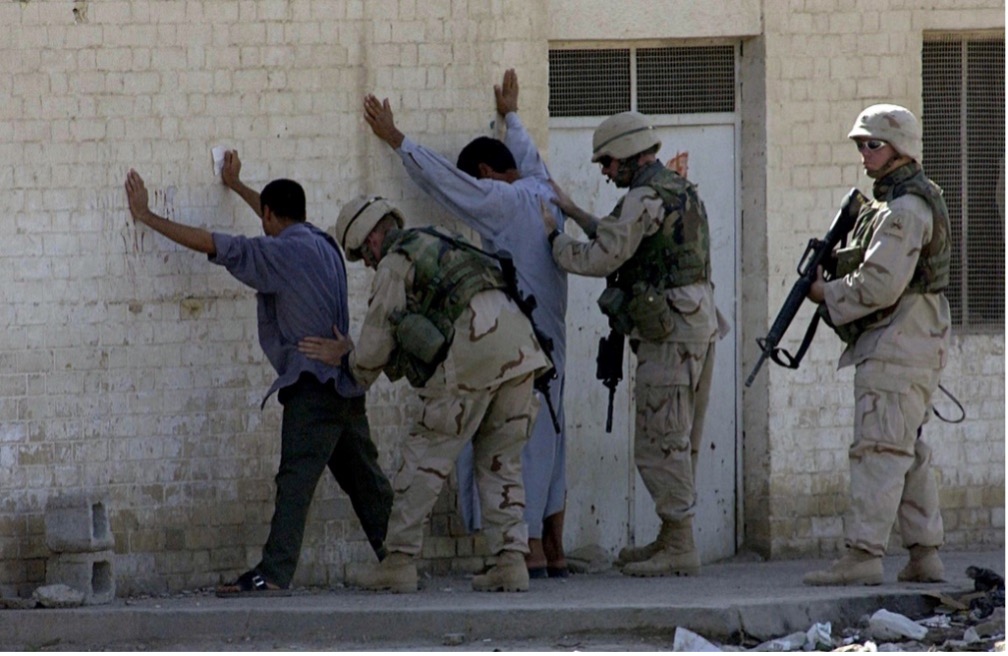
US Soldiers searching civilians, Baghdad. Photo by Stacy Pearsall, care of US National Archives
The twentieth anniversary of the 2003 US invasion of Iraq slid by with an encore performance of the arrogance that characterized the invasion itself. In 2003 that arrogance disregarded inconvenient international norms as easily as it disregarded the Iraqi victims caught in the path of “shock and awe” bombardments. The arrogance was not only deadly to hundreds of thousands of Iraqis (the majority of them civilians), but a delusional basis for policy. The war turned out to be no walk in the park showcasing American technology; the US created chaos that raged for decades, destroying lives and the social fabric of the region while reshaping the rules of conflict around the world.
Twenty years later Americans are still mired in self-absorption. Those who think of the invasion at all (and few of my university students can even find Iraq on a map) regret only the disappointing outcome. Most now admit “mistakes were made” (bad decisions from the White House, poor intelligence, a mismanaged occupation . . .), but only to distance themselves from accountability. American introspection on Iraq is limited to weighing the war in US lives and dollars lost and judging it pricey for the booby prize of Iraqi ingratitude. This is not progress, it is petulance, and it bodes ill for a declining America’s interactions with a complex world.
What We Say When We Don’t Talk About Iraq
There are times when choosing to forget might make sense. That drunken kiss in the elevator? The sharp retort on a busy workday? The premeditated destruction of a country is not really in the same category. Yet in the US the war is treated as if it were a chapter the nation can choose not to revisit. This is no kindness to the sensibilities of Iraqis; it is an aggression of its own.
Post-conflict truth-and-reconciliation processes characterize selective silence on the past as a form of cultural violence. These processes, developed over the past thirty years to heal societies traumatized by dirty wars, apartheid, or genocide, emphasize the need for a complete accounting of injuries as a precondition for any dialogue. The refusal of offenders to acknowledge wrongdoing is implicitly threatening as it advertises the continued dynamics of unequal power.
The silence on Iraq adds to the long list of behaviors Americans have been reluctant to acknowledge: ethnic cleansing of the Americas, the financial legacies of enslavement, direct and proxy-waged wars of imperial control, ongoing support for brutal regimes today . . . The list is long but, happily for many, it weighs little on the conscience of most Americans not victimized by the aggressions. Privilege holds many advantages, and one is the ability to deny liability.
Willful forgetting on Iraq began long before the invasion of 2003. Americans also chose not to recall US support for Saddam Hussein as he climbed to power as a US partner in the 1980s. They certainly don’t think about the US role in facilitating his abysmal human rights record (which included the use of chemical weapons on his fellow citizens in the 1980s) or the deaths US-imposed sanctions caused in Iraq during the 1990s. In erasing these chapters of Iraq-US history Americans neatly avoid any responsibility for creating the leader later used to justify American conquest.
The invasion of 2003 and its aftermath merely added to the history Americans choose to forget. Americans forget that bombed infrastructure, like the electric and telecommunications grids, degraded civilian life, education, and health for years. Americans don’t think about the US decision to plan for quick control of the oil ministry, while leaving the national museum vulnerable to looters. They don’t think about their clumsy dismantling of government bureaucracies that shuttered any functionality, or of their sectarian manipulations that led Iraq into civil war. There is so much Americans don’t think or talk about today when they don’t talk about the war: the Abu Ghraib prison abuse, the night raids, the accidental shootings at roadblocks, the black hoods, the zip ties . . . the torture.
To not talk about any of this is to say very clearly that the pain of Iraqis still does not matter.
Wishing Doesn’t Make It So
The American privilege of seeing only pieces of the past through a self-congratulatory haze is drawing to a close. The shrinking global role of the US economy, increasingly competitive international arms and investment markets, and a more diversified global media landscape have been steadily eroding US dominance for years, but the US has been slow to adapt. Americans continue to mistake their illusions of the US role in the world for the reality, and remain mystified when the world fails to follow their expectations. The failure of Iraqis to welcome the US as liberator in 2003, and the tepid responses from outside of Europe to calls for condemnation of and isolation of Russia following the invasion of Ukraine in 2022, could have been surprises only to a US deeply entrenched in selective memory of the past century.
Nothing makes the disconnect between American blindness to its history in Iraq and the region’s vision of that history clearer than the recent push by the US to hold Putin accountable for violations of international law and war crimes. Violation of sovereignty? Civilian deaths? Separation of children from families? Unlawful imprisonment? It is hard to hear the charges the US makes against Russia and not be stunned by the hypocrisy.
For the rest of the world, and most especially the Middle East, it is not just the brazen invasion of 2003, but the last twenty years of the Global War on Terror that provide the prism for viewing Russia’s actions in Ukraine. How are the drone strikes in Yemen, Libya, Somalia, and other countries anything but violations of sovereignty? Millions of civilian lives were ended or permanently derailed as a consequence of the US wars in the region, including an estimated eight million refugees from Iraq alone. And the recent condemnation of Russia’s use of cluster munitions appears particularly hypocritical for those who recall that the US use of the same in Iraq maimed thousands of children attracted by the bright colors of the unexploded bombs. Putin should certainly be called out for deporting children, but the US hardly has a stellar record. The US regularly detained minors in counter-terrorism prisons, including Guantanamo. Some were as young as 14, and one, arrested at 16 and subjected to nearly two years of secret prison detentions and torture under the rendition program, was only released in 2022 after twenty years of imprisonment, despite never having been charged with or tried for a crime.
Ukraine and the Legacy of the US Invasion of Iraq
Americans damaged what little world order there was in 2003, and until that history is acknowledged the US is ill-qualified before the world to pronounce moral judgements on others, including Russia’s actions in Ukraine. So far, this has not proven a gain. Will a world without condemnation of unilateral aggression be an improvement? Where cross-border drone strikes, secret renditions, torture, and unsanctioned military placements multiply without censure? Having everyone carry on as the US did in 2003 might be karma, but it can’t make anyone more secure. If the American people really want to hold Russia or anyone else accountable for aggression, they will need to hold their own leaders and themselves accountable for the crimes in Iraq first. It is not enough to say “mistakes were made” in Iraq, that is not accountability.
Americans barely noticed the anniversary of the Iraq invasion when they should have seen the legacy of that war playing out now in Ukraine. Ongoing denial of the damage the US caused not only continues the insult to the Iraqi victims, it prevents the US from playing any role in steering the world back from the new norm of unilateral aggression.

1,158 total views, 1 views today
